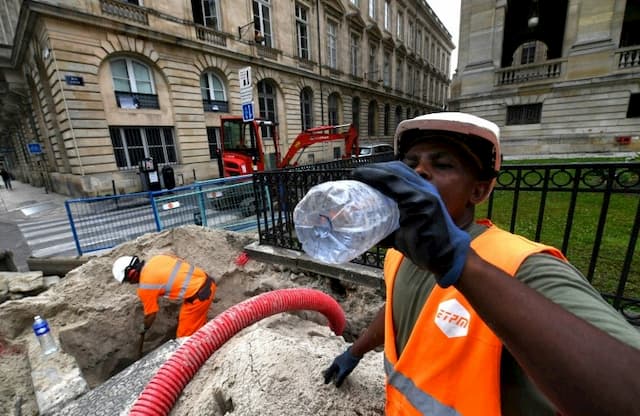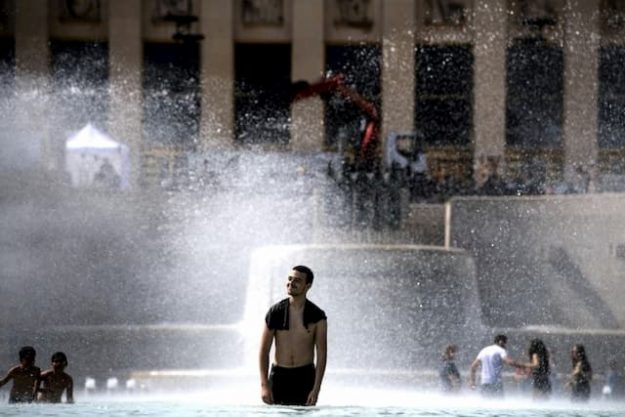The heat Wave Sets In: 53 Departments on Orange Alert

This Tuesday 25th June 2019, half of the country is on orange alert for a heat wave, while the temperatures should rise to nearly 40 ° C.
The temperatures will continue to climb this Tuesday 25th June 2019 over most of France: more than half of the country is in orange alert two days from the expected peak of the heat wave, unpublished for a month of June.
If the weather will be unstable in the north-west of the country, the weather will be dry and very hot elsewhere.
🔶 53 dpts en #vigilanceOrange
Restez informés sur https://t.co/rJ24zzmmy4 pic.twitter.com/tpZt1TTxa8
— VigiMétéoFrance (@VigiMeteoFrance) 25 June 2019
An orange vigilance for heat wave has been launched on 53 departments, including all of the Ile-de-France, Grand-Est, Bourgogne-Franche-Comté and Center-Val-de-Loire regions.
The heat settled on Monday in central and eastern France. An unprecedented precocity which has already pushed the inhabitants to seek the corners of shadow and the public authorities at the bottom of the fight against the health risks.
College brevet postponed
President Emmanuel Macron, assured that “the whole government” was mobilized to face it.
First important consequence: the college brevet tests, which were to take place on Thursday and Friday, are postponed at the beginning of next week in all metropolitan France.
Monday afternoon, the thermometer rose to 31.3 ° C in Paris, 32.4 ° C in Lyon, 32.8 ° C in Grenoble, 33.5 ° C in Clermont-Ferrand, according to the organization of the forecast. 37 ° C were reached at Carpentras, 35 ° C at Avignon.

39 ° C this Tuesday
Tuesday, we will progress a notch to enter the episode canicular: 34 ° C expected in Paris and Reims, 36 ° C in Nancy, Metz, Strasbourg, 37 ° C in Lyon, 39 ° C in Grenoble. On Wednesday, the 40 ° C mark will be reached in Besançon, Nevers, and the mercury should reach 41 ° C in Clermont-Ferrand or Lyon.
In Paris, a “new device” for polluting vehicles will be set up, with a “much faster” activation of alternating traffic in the face of pollution peaks, said Minister of Energy Transition François de Rugy.
In addition, residential parking will be free as of Tuesday because of the air pollution expected in connection with this heat wave, announced the City.
Les fortes chaleurs vont s’accentuer. De mercredi à vendredi, la remontée d’une masse d’air saharienne exceptionnellement chaude donnera lieu à des températures au niveau des records mensuels voire absolus. (40°C régulièrement atteints ou dépassés).#VigilanceOrange #canicule pic.twitter.com/Npzfx2lW1X
— VigiMétéoFrance (@VigiMeteoFrance) 24 June 2019
2003 Souvenir
In Lyon, the heat was already stifling Monday, the tourists finding refuge in the shade of the “traboules”, the passages of Old Lyon, others braving a queue of 50 meters to access the swimming pool of the Rhone, d others still seeking the shade of gardens and museums.
This heat wave from the Sahara rekindles the memory of the August 2003 episode, which had generated excess mortality of 15,000 people over more than 15 days.
The episode of this week is unprecedented in its intensity and precocity since 1947 and the establishment of detailed records, says Météo-France.
#Canicule : combien de jours de fortes #chaleurs allez-vous connaître ? pic.twitter.com/9Io2RG39Eb
— La Chaîne Météo (@lachainemeteo) 24 June 2019
Records
From the middle of the week, records will be established for a month of June or “locally all months”. The hottest day will be Thursday or Friday.
The heat wave, which involves at least three days and three nights beyond a certain temperature threshold (different depending on the region), should extend beyond the weekend at least over a large half of the south-east says Etienne Kapikian, forecaster at Météo-France. No region should be spared, including the northwest at the end of the week.
“Heat islands”, cities suffer particularly, because of concrete soils, the lack of trees and the intensity of human activities.
Things to do
The authorities remind people of the need to drink water regularly, to wet the body and to protect the skin. The information platform “Canicule info service” is available on 0800 06 66 66 (toll-free number).
“I am a senior so I stay at home,” said AFP Mireille Soler, an 80-year-old from Marseilles. “I drink a lot, I cool off. But it is worrying these temperatures, one wonders what it will give for the next years.
☀️🌡️Un épisode de #canicule va toucher tout le territoire dans les jours qui viennent. 5 départements de la région parisienne sont d’ores-et-déjà placés en #vigilanceOrange, et la chaleur va s’accentuer. Soyez vigilants et adoptez les bons comportements ⬇️ pic.twitter.com/hEXqmcI8sw
— Ministère de l’Intérieur (@Place_Beauvau) 23 June 2019
The announcement of these hot weather has caused a rush on equipment to cool the air, according to several distributors.
Electricity consumption will be “significant”, with a “potential peak of summer consumption Thursday at 13h”, but the supply should be assured without problems, said the manager of the high-voltage network, RTE.
Global warming
With global warming, on a seasonal scale, it is the summer that heats up the most. In Paris, the five coolest summers were all observed before 1980.
According to the scenarios of Météo-France, “the warming could reach 2 ° C by 2071-2100” in the country compared to the pre-industrial era, even 4 ° C for the most pessimistic, with waves of two to three times more heat by mid-century.
Enjoyed this? Get the week’s top France stories
One email every Sunday. Unsubscribe anytime.


